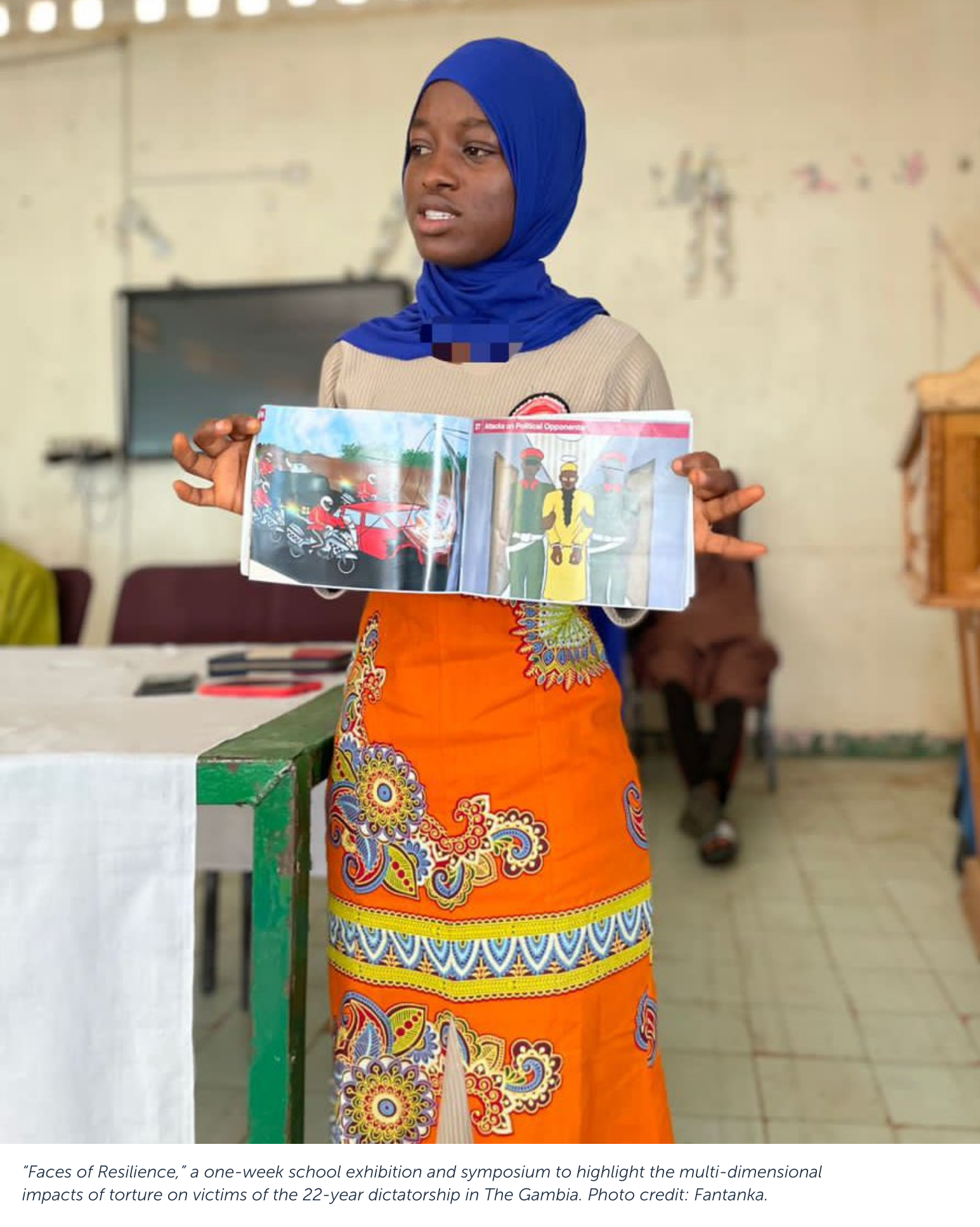The Global Initiative for Justice, Truth and Reconciliation (GIJTR)
Mamadou Boussouriou Diallo, Guinean local partner, 2019
“GIJTR starts at the bottom, bringing together victims and human rights defenders to address the most immediate concerns. This is most needed, because we can organize events at the highest level of the state, but if these events don’t take into consideration the victims’ problems it won’t succeed. So for me, GIJTR does important work because it focuses on bottom-up approaches.”
Around the world, there is an urgent need for justice, truth and reconciliation in countries where legacies of gross human rights violations cast a shadow on transitions from repressive regimes to participatory and democratic forms of governance. To date, however, many transitional justice models have failed to actively involve local voices, which are crucial to ensuring a secure and peaceful future. Only when all members of a society—particularly marginalized groups such as women and survivors—are able to share their stories and engage in these processes can cycles of violence be replaced with the emergence of peaceful, flourishing communities.
In an effort to rectify this gap, the Global Initiative for Justice, Truth and Reconciliation (GIJTR)—led by the International Coalition of Sites of Conscience (ICSC), a global network of museums, historic sites, memorials and memory initiatives that use the past to address human rights today—offers holistic, integrative and multidisciplinary approaches to issues of truth, justice and reconciliation. A consortium of nine international organizations, GIJTR works with local populations, civil society organizations (CSOs) and governments to develop context-specific transitional justice approaches that are victim-centered and collaborative and support dignity, respect, inclusion and transparency in societies emerging from conflict or periods of authoritarian rule.
GIJTR includes the following international partners (at the time of publication): American Bar Association Rule of Law Initiative, USA; Asia Justice and Rights (AJAR), Indonesia; Center for the Study of Violence and Reconciliation, South Africa; Documentation Center of Cambodia, Cambodia; Due Process of Law Foundation (DPLF), USA; Fundación de Antropología Forense de Guatemala (FAFG), Guatemala; Humanitarian Law Center, Serbia; and Public International Law and Policy Group, USA. In addition, ICSC as lead taps into the knowledge and long-standing community connections of its 350+ members in more than 65 countries in order to strengthen and broaden GIJTR’s work.
GIJTR partners develop and implement a range of rapid-response and high-impact program activities, utilizing restorative and retributive approaches to justice and accountability for gross human rights violations. The expertise of the organizations in GIJTR includes:
truth-telling, reconciliation, memorialization and other forms of historical memory;
documenting human rights abuses for transitional justice purposes;
forensic analysis and other efforts related to missing and disappeared persons;
victims’ advocacy such as improving access to justice, psychosocial support and trauma mitigation activities;
providing technical assistance to and building the capacity of civil society actors and organizations to promote and engage on transitional justice processes;
reparative justice initiatives; and
ensuring gender justice in all these processes.
Since its founding in 2014, GIJTR has overseen the development and implementation of documentation and truth-telling projects; undertaken assessments of the memorialization, documentation and psychosocial support capacities of local organizations; and provided survivors in Africa, Asia, Latin America, and the Middle East and North Africa region with training, support and opportunities to participate in the design and implementation of community driven transitional justice mechanisms. Country-based projects have included Bangladesh, Colombia, Ethiopia, The Gambia, Guinea, Mexico, Sudan and Ukraine. In addition, more than 30 thematic projects have been implemented, with specific attention paid to overlooked and emerging issues within the transitional justice field. Thematic projects have included the following:
Strengthening Religious and Faith-based Actors’ Engagement with Transitional Justice
Centering Young Activist Voices in Atrocity Prevention
Enhancing the Synergy Between Transitional Justice and Constitution-Drafting
Understanding and Addressing Violations of Economic, Social and Cultural Rights in Transitional Justice
Engaging Indigenous Communities in Transitional Justice Processes
Advancing a Holistic Approach to Justice and Accountability for CRSV Survivors
Over nearly 10 years, GIJTR has engaged 760 local CSOs; worked with stakeholders from 76 countries; produced 41 publications including toolkits, reports and guidelines for victim-centered best practice; developed 11 policy papers; facilitated the collection of more than 7,460 narratives of human rights violations; and, through micro-grants and mentorship, provided support to 588 CSOs to implement community-driven transitional justice projects.
Through a combination of country-based and thematic projects, GIJTR’s range of programming prioritizes networking, collaboration and local ownership for all stakeholders. Given the diversity of experiences and skills among its partners and ICSC network members, GIJTR offers both post-conflict countries and those emerging from repressive regimes a unique opportunity to address transitional justice needs in a timely manner, while promoting local participation and building the capacity of community partners to lead on matters related to truth, justice and lasting peace.
“Throughout the mandate of our truth commission, the Global Initiative for Justice, Truth and Reconciliation has been one of the most constant cooperation organizations, helping with the development of community methodologies in the first months of the commission, mapping the archives of civil society [organizations] and developing their capacities to prepare digital archives for us, and sharing the successful experience of Latin America in participatory truth-seeking.
Lucía Gonzales
Colombian Truth Commissioner, 2022



